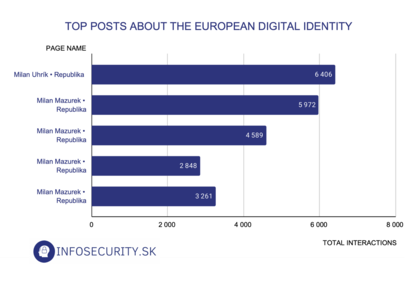DISINFORMATION
Far-right actors spread claims of the EU becoming a “military federation”, false narratives about the EU’s Digital Identity are on the rise as well

- Far-right figures falsely assert that the European Parliament plans to turn the EU into a "military federation." They create panic and urgency, misrepresenting non-binding proposals as definitive laws.
- The same politicians spread baseless fears about the European Digital Identity, alleging control and data selling by the EU. In reality, the digital identity is voluntary, will not replace existing IDs, and ensures citizens maintain data control with stringent security measures.
- Mainstream media is under attack, and alternative sources are gaining prominence. This trend raises concerns as dangerous websites gain traction, raising concerns about the marginalized role of mainstream media and the potential rise of misinformation.
Far-right actors are disinforming about the European Parliament’s proposals
In the past two weeks, far-right politicians and disinformation sites have targeted the European Union. This time, they are disinforming about new proposals that the EU is negotiating about, is set to implement, or could implement in the distant future. One is the claim that the European Parliament voted to transform the EU into a “military federation”.
The first one who came with this information was the chairman of the far-right Republika party as well as an MEP, Milan Uhrík. In a video recorded in the European Parliament, he claims that “a defense union with its own army is to be set up, which is to make order wherever the snowflakes feel like it”. The post was re-shared by the disinformation sites Raptor-TV.cz and InfoVojna (“InfoWar”).
Milan Mazurek, a vice-chairman of the party, also claimed the MEPs voted to transform the EU into a “military union”. He also took this chance to criticize Slovak MEPs for not standing up against the proposal and to announce his candidature to the European Parliament in the upcoming European elections.
The actors mentioned above are talking about the proposals of the European Parliament for the amendment of the EU Treaties. In these proposals, there are indeed mentions of establishing a defense union with its own European army. What the actors are purposefully omitting, however, is the fact that the amendments have only a proposing nature. The proposals mentioned are only suggestions on what changes the European Parliament would “like” to see. They are not binding.
Changing the EU Treaties (primary law) is a very long and highly complicated process. Firstly, a convention would have to be established, which could last for several years. Secondly, a proposal for change or a new Treaty will be drafted. The European Parliament, the Council, and individual Member States must then approve this draft. The actors mentioned intentionally leave out this information, making it seem like the proposals are a final form of the law. All this rhetoric does is create a sense of urgency and spread panic, which they then use to advance their political agenda. Both of these politicians are very likely to become candidates for the European Parliament, and with this rhetoric, they are most probably preparing for the upcoming elections. They attempt to create fear and an image of the enemy, which they will then artificially fight against and promise to protect Slovaks from.
The EU is supposedly aiming to enslave us using the European Digital Identity
Another topic concerning the EU that gained traction among the Slovak disinformers was the European Digital Identity. It is an instrument with which the EU citizens will be able to prove their identity where necessary to access services online, to share digital documents, or simply to prove a specific personal attribute, such as age, without revealing their full identity or other personal details. In the understanding of the disinformation actors however, the European Digital Identity will be used to control European citizens.
Milan Mazurek was by far the most active actor addressing this topic. This development seems logical since, as was already mentioned, he has announced his candidacy for the European Parliament. In one of his several posts, he claims that “if you look at or read the World Economic Forum materials, you will see that digital identity is, in their view, a tool to control people. At first, they give it to you as an advantage, and later on, you can do nothing without using it.”
In another post, the far-right politician writes the following: “While at first it is presented to us as an advantage, later on, we cannot do without it. Together with digital money, they will decide how much choice and freedom they leave us.” Furthermore, Milan Uhrík says that the digital identity will “replace the physical identity” of citizens.
Disinformation site IneNoviny (“DifferentNews”) claims that in addition to controlling people, the EU will also “sell” personal data. “People will not know who is doing what with their data,” the website writes.
However, the European Digital Identity cannot be used to “control people” - holding an EU Digital Identity Wallet will be a voluntary choice for every citizen and is not going to replace existing ID documents.
Additionally, as the digital identity deals with citizens’ sensitive data, the EU will implement many security measures, including transparency. Therefore, it is improbable that the EU would “sell” citizens’ data, and they would not know what it is being used for. On the contrary, the EU promises that citizens will always have full control of the data they share and by whom.
Since posts about the European Digital Identity have been prevalent in the Slovak information space in the past two weeks, we also looked at the topic through the lens of a list of disinformation actors in Slovakia. We used the CrowdTangle analysis tool to analyze the most popular posts on Slovak Facebook, including the keyword “digital identity”. Posts were evaluated based on the total number of interactions (the sum of all reactions, comments, and shares).

As the results show, the most active actors spreading false narratives about this topic were the members of the far-right Republika party, more specifically, the party’s vice-chairman, Milan Mazurek.
The first place belongs to the post mentioned above by Milan Uhrík, in which he falsely claims that the European Digital Identity is set to “replace the physical identity” of an individual.
The second and third places belong to the aforementioned posts (1,2) by Milan Mazurek, in which he falsely claims that the EU Digital Identity will be used to “control” people.
In another post, Mazurek claims that digital identity is “the end of freedom. The government will hand over our lives and rights to Brussels and the psychopaths of the World Economic Forum.” In this way, disinformers build on the false narratives that Slovakia is losing its sovereignty and is becoming a colony of the EU and other international structures it is a part of.
Mazurek also re-shared a post made by his fellow party member, Ján Kecskés, in which he claims that he rejects the introduction of the European Digital Identity and adds: “We are not numbers that officials can switch off whenever they like!” It is difficult to determine the original meaning of this statement. However, this does not interfere with the likely goals of these actors – to create information chaos and an atmosphere of fear, which they can later use to their advantage to gain political preferences.
Mainstream media in Slovakia is under attack, and alternative sources are being defended
For several weeks now, the topic of media has been steadily gaining much attention in the Slovak information space. This is mainly because of the statements of the new Prime Minister Robert Fico and his choice to refuse entry of some mainstream media outlets into the government office building. These media outlets have been previously critical of his party, SMER-SSD.
Since the elections, the ruling coalition has pursued a policy that relegates the mainstream media to the periphery, deliberately making their work more difficult and continuing to attack them. In this sense, one of the most prominent types of rhetoric has been that the alternative media in Slovak faced unjustified “censorship”, and now mainstream sources are experiencing the same thing, but there is suddenly an “outcry” because of it.
Eduard Chmelár, a dubious political commentator and an advisor to Prime Minister Robert Fico, criticized the Slovak president Zuzana Čaputová on his Facebook page, saying: “When the one who wanted to shut down inconvenient websites calls for respect for the media”. In the post, he directly referenced a statement of the president, in which she condemned media censorship as undemocratic.
The disinformation site Badatel, notorious for spreading dangerous conspiracy theories, wrote in a post: “Markíza (one of the biggest commercial television companies in Slovakia) enjoyed when alternative media were being destroyed by censorship. Now, it will experience the feeling of losing 50% of its advertising revenue to the state!”
The same talking point was then repeated by Slobodný vysielač (“Free broadcaster”) by claiming that the previous government was “shutting down opposition websites” and there were no “protests” about censorship.
In reality, those are two incomparable situations. The “inconvenient” websites these actors are speaking about are in reality pages that would post dangerous conspiracy theories about essential topics such as health, pro-Russian propaganda or blatant disinformation that was easily debunked. Calling them mere “opposition” sites is a deliberate diminution of their true nature. These were not just sites criticizing a party or a government. They were truly dangerous sources of information that, at their core, could not be compared to the mainstream media simply because the latter were critical of the current ruling parties.
Additionally, apart from the harmful content itself, these problematic media outlets were successful in avoiding any adherence to journalistic ethics and fundamental editorial rules. At the same time, they have long been major sources of poor quality and toxic content, including the deliberate dissemination of non-factual information and the use of manipulative techniques.
At the same time, in Slovakia, we are observing an alarming trend where mainstream media are being pushed to the sidelines while alternative sources of information are coming to the fore. They are then slowly becoming the primary sources of information about political events, a development supported by a number of politicians.
Project Infosecurity.sk organized by Adapt Institute, which is supported by the Prague office of the Friedrich Naumann Foundation for Freedom, continuously monitors the activities of both Slovak and foreign disinformation actors, but focuses mainly on the former. The project activities are built upon daily monitoring of emerging disinformation, hoaxes, and conspiracy theories in the online information space. This approach allows the analysts to identify disinformation posts and narratives that resonated with the public the most, as well as to find out where they originated, and how they spread and evolved on social media. The report takes the form of a bi-weekly summary of arising trends in the spread of malicious information content online. Based on that, Infosecurity.sk can warn the public about emerging and current trends in the field of disinformation, manipulation, and propaganda.

